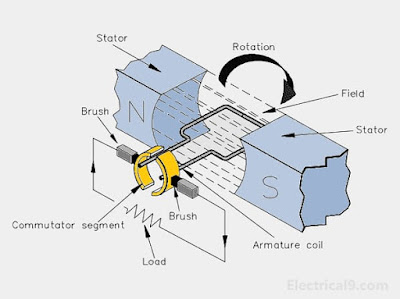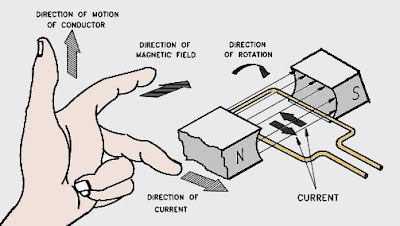Working principle of dc generator
Working principle of dc generator
Theory of operation of dc generator and construction and working principle of dc generator.
A basic DC generator has four basic parts:
(1) a magnetic field (2) a single conductor or loop
(3) a commutator and (4) brushes.
Theory of operation of dc generator and construction and working principle of dc generator.
A basic DC generator has four basic parts:
(1) a magnetic field (2) a single conductor or loop
(3) a commutator and (4) brushes.
 |
| A basic DC generator working |
working principle of dc generator :
The magnetic field may be supplied by either a permanent magnet or an electromagnet. For now, we will use a permanent magnet to describe a basic DC generator.
A single conductor, shaped in the form of a loop, is positioned between the magnetic poles. As
long as the loop is stationary, the magnetic field has no effect (no relative motion).
If we rotate the loop, the loop cuts through the magnetic field, and an EMF (voltage) is induced into the loop. When we have relative motion between a magnetic field and a conductor in that magnetic field, and the direction of rotation is such that the conductor cuts the lines of flux, an EMF is induced
into the conductor.
The magnitude of the induced EMF depends on the field strength and the rate at which the flux lines are cut, as given in equation (1). The stronger the field or the more flux lines cut for a given period of time, the larger the induced EMF.
Eg = KΦN ....Equation(1)
where,
Eg = generated voltage
K = fixed constant
Φ = magnetic flux strength
N = speed in RPM
direction of the induced current:
The direction of the induced current flow can be determined using the "left-hand rule" for
generators. This rule states that if you point the index finger of your left hand in the direction
of the magnetic field (from North to South) and point the thumb in the direction of motion of
the conductor, the middle finger will point in the direction of current flow (Figure 2). In the
generator shown in Figure
 |
| direction of current in dc generator |
Commutation action:
Armature or loop connected to commutator (as shown in image 1).commutator are segments of metal and insulated material provided between each metal segments.Commutator convert AC voltage to DC voltage by mechanically conversion method.
Brushes are attached to both side to commutator to collect generated current and send to output and then supply.















No comments :
Post a Comment